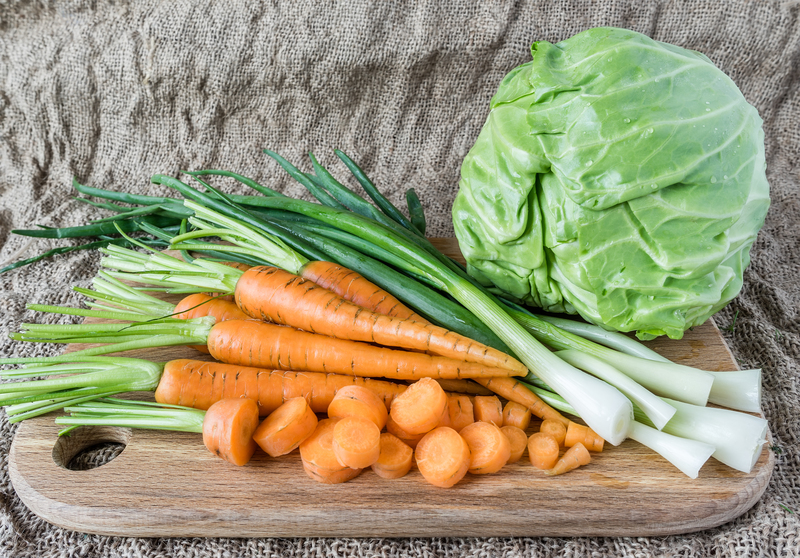Converting Organic Waste into Fertilizer: The Path to Healthy Soil
Posted on 22/08/2025
Introduction: Turning Waste into Wealth for the Soil
In a world increasingly aware of sustainability, converting organic waste into fertilizer emerges as a pivotal strategy for enhancing soil health and promoting eco-friendly agricultural practices. Every day, households and industries produce massive amounts of organic waste--from kitchen scraps to garden trimmings and agricultural byproducts. Instead of sending this valuable resource to overflowing landfills, understanding how to repurpose organic matter into nutrient-rich fertilizer is transforming the way we nourish our soils, crops, and gardens.
This comprehensive guide explores the multitude of benefits, methods, and practical steps involved in turning organic waste into fertilizer, emphasizing its crucial role in paving the path to healthy and sustainable soils.

Why Convert Organic Waste Into Fertilizer?
Organic waste recycling stands as one of the most effective, natural, and sustainable ways to improve soil fertility and reduce the environmental impact of waste. Here's why:
- Reduces landfill burden: Organic waste makes up a significant portion of municipal garbage. Composting it into fertilizer minimizes landfill use and methane emissions.
- Enriches soils naturally: The resulting product boosts soil structure, water retention, and nutrient content--essential for robust plant growth.
- Reduces chemical dependency: Natural fertilizers decrease the need for synthetic amendments, promoting healthier food systems and biodiversity.
- Cost-effective: Home and community composting methods cut garden and agricultural expenses, turning waste into a valuable soil amendment.
- Contributes to a circular economy: Repurposing organic material closes the loop in food and yard waste cycles.
Understanding Soil Health and Its Importance
Soil health is critical--it determines not just crop success, but also water quality, carbon sequestration, and ecosystem vitality. Healthy soil teems with microbial life, organic matter, and the right balance of minerals and air. Using organic fertilizer made from decomposed waste helps maintain and enhance all these qualities, creating a resilient foundation for sustainable agriculture and gardening.
The Science Behind Organic Waste Conversion
Converting organic waste into organic fertilizer primarily takes place through the process of decomposition--the biological breakdown of material by microorganisms, fungi, and in some cases, insects. This process not only breaks down complex organic molecules but also transforms raw waste into stable, nutrient-dense compost that can be applied to soils.
Key Aspects of Decomposition
- Microbial Action: Bacteria and fungi are the main players, rapidly breaking down kitchen and yard waste under the right conditions of moisture, heat, and aeration.
- Composting: This controlled decomposition process creates nutrient-rich humus, the best form of organic fertilizer for soil amendment.
- Vermicomposting: Earthworms help accelerate the process and enhance nutrient content as they digest and excrete organic material.
- Industrial Composting: Larger-scale operations use advanced techniques like windrow, in-vessel, or aerated static pile composting for municipal or agricultural organic waste.
The science is straightforward: With the right balance of carbon (brown material like dry leaves) and nitrogen (green material like vegetable scraps), plus moisture and air, organic waste turns into a powerful, natural fertilizer.
Types of Organic Waste Used for Fertilizer Production
Understanding which organic wastes are suitable is essential. Not all organic matter is ideal for composting. Typical materials include:
- Food scraps: Fruit and vegetable peels, coffee grounds, eggshells, tea leaves, and stale bread (but avoid meat, oil, and large amounts of dairy).
- Yard waste: Grass clippings, dry leaves, straw, wood chips, and plant trimmings--all excellent sources of organic matter.
- Manure: Commercial and backyard animal manure (from herbivores), rich in nutrients but should be composted before applying to avoid pathogens.
- Crop residues: Stalks, husks, and other non-food parts left after harvest improve soil organic content.
- Industrial organic byproducts: Such as brewery waste, coffee husks, and spent grains.
Materials to Avoid in Composting
While most organic waste can be composted, some materials can attract pests, cause odors, or introduce disease:
- Meat, fish, and dairy: These can slow down decomposition and attract animals.
- Invasive plant species: Some weeds can survive composting and later infest your garden.
- Treated wood or plants with pesticides/herbicides: Chemicals can linger and harm soil or plant health.
- Pet waste: (from carnivores) can introduce harmful pathogens.
Composting Methods for Turning Organic Waste Into Fertilizer
There are several approaches to converting organic materials into valuable fertilizer. The right method depends on the scale, available resources, and intended use:
1. Home Composting
*Home composting* is a simple, sustainable way to manage household organic waste and produce fertilizer for gardens and lawns. Popular systems include:
- Backyard compost piles: Simple and low-cost, they require regular turning and monitoring of moisture and temperature.
- Compost bins or tumblers: Ideal for urban spaces, containing smells and pests, and speeding up decomposition via easy turning.
The basic steps are:
- Layer brown (carbon-rich) and green (nitrogen-rich) materials.
- Maintain moisture--compost should feel like a wrung-out sponge.
- Turn regularly to aerate and speed up decomposition.
- Wait for the compost to become dark, crumbly, and earthy smelling--your fertilizer is ready!
2. Vermicomposting
Vermicomposting harnesses special earthworms (such as Eisenia fetida) to break down organic waste efficiently. The process yields rich worm castings, noted for their superior nutrient content and microbial diversity.
- Set up a worm bin with bedding, such as moist shredded newspaper.
- Add small quantities of food scraps regularly.
- Harvest worm castings after a few weeks to a month.
3. Bokashi Composting
An anaerobic process originating from Japan, bokashi composting uses special inoculated bran to ferment food waste, including small amounts of meat and dairy. The "pre-compost" produced is then added to a regular compost pile or directly into the soil.
4. Community and Industrial-Scale Composting
For larger amounts of organic waste (from neighborhoods, restaurants, farms), centralized composting facilities use advanced methods:
- Windrow composting: Long, aerated rows of organic material that are periodically turned with machinery.
- In-vessel composting: Enclosed systems that can handle food and yard waste, controlling temperature and airflow for rapid decomposition.
- Aerated static pile: Forced air speeds up the composting of large quantities.
Benefits of Organic Fertilizer for Healthy Soil
Eco-friendly fertilizers made from recycled organic matter boast advantages that far outstrip synthetic counterparts:
- Improved Soil Structure: The humus formed enhances aeration and helps retain nutrients and water, reducing the likelihood of drought and erosion.
- Microbial Vitality: Organic fertilizers boost beneficial microorganisms that fix nitrogen, decompose plant residues, and protect against soil-borne pathogens.
- Balanced Nutrient Release: Organic fertilizers break down slowly, providing a steady supply of nutrients to plants without nutrient runoff that can harm waterways.
- Reduced Chemical Pollution: Using compost and other natural amendments significantly cuts down harmful chemical leaching into the environment.
- Carbon Sequestration: Building organic matter in the soil captures atmospheric carbon, helping fight climate change.
Comparing Organic and Synthetic Fertilizers
While chemical fertilizers offer immediate nutrient availability, their overuse often leads to soil acidification, loss of beneficial organisms, and water pollution due to runoff. In contrast, organic compost fertilizer:
- Rebuilds soil health and fertility in the long-term.
- Encourages biodiversity and resilience against pests and disease.
- Lowers the risk of over-fertilization and environmental damage.
How to Use Organic Waste-Derived Fertilizer
Applying organic fertilizer is straightforward, but some strategies optimize its benefits:
- Mix well into garden beds and fields before planting to improve the root zone.
- Top-dress vegetables, fruit trees, and lawns during the growing season for a nutrient boost.
- Brew compost tea to water plants for both nutrient delivery and pest/disease resistance.
- Mulch with finished compost to aid moisture retention and suppress weeds.
- Monitor soil health with periodic testing to fine-tune organic amendments as needed.
Whether used in backyards, school gardens, urban rooftops, or large farms, organic fertilizer from recycled waste is key to sustainable land management and healthy soil.
Common Challenges & Best Practices
While transforming organic waste into fertilizer is very rewarding, it can present a few hurdles:
- Odors and pests: Avoid by balancing green and brown materials, keeping piles aerated, and burying food scraps.
- Contamination: Do not add plastics, synthetic chemicals, or invasive weeds to compost bins.
- Slow decomposition: Chop up large items, maintain moisture, and turn the pile for proper aeration.
Best practices for optimal results include:
- Monitor temperature--hotter piles decompose faster and destroy pathogens.
- Keep compost moist but not soggy.
- Regularly turn and mix the pile to maintain oxygen flow.
- Finish with sieving or screening to remove large, undecomposed materials before using the compost as fertilizer.

The Global Impact: Sustainability and a Healthier Planet
Adopting the practice of converting organic waste into fertilizer has far-reaching implications for global sustainability:
- Reduces greenhouse gas emissions (notably methane from landfills) and builds broad climate resilience.
- Restores degraded soils in both cities and rural areas, leading to greater food security and biodiversity.
- Empowers communities--from urban gardening collectives to traditional farmers--to independently enrich their land without synthetic chemicals.
- Supports the circular economy, turning waste into a resource rather than an environmental liability.
Conclusion: Embracing the Path to Healthy Soil
The journey from organic waste to fertilizer is more than just recycling--it's a holistic approach that redefines how we value resources, manage ecosystems, and nourish future generations. By adopting composting, vermicomposting, or other eco-friendly methods, individuals and communities make a significant impact on soil health, food quality, and environmental vitality.
Whether you are a backyard gardener, a commercial grower, or an environmentally conscious citizen, turning organic waste into fertilizer offers a powerful, practical path to healthy soil and a more sustainable planet. Embrace the practice--your soils, plants, and the planet will thank you.
Start Converting Today!
Ready to join the movement? Begin by collecting your kitchen and yard scraps, setting up a compost bin, or joining a community composting program. Watch as your waste transforms into a black gold that fuels lush growth and revives the very foundation of all life--the soil beneath our feet.
Latest Posts
Master the art of cultivating your own herb haven
Unveiling the Secrets to Thriving Orchids
Captivating Zen Garden Designs for a Peaceful Backyard Retreat

